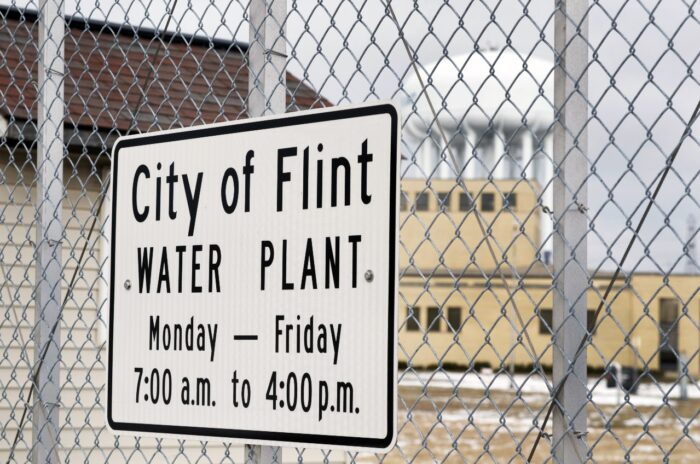Top Class Actions’s website and social media posts use affiliate links. If you make a purchase using such links, we may receive a commission, but it will not result in any additional charges to you. Please review our Affiliate Link Disclosure for more information.

Flint Water Crisis Class Action Settlement Overview:
- Who: A Michigan federal judge has ruled that Flint City Council cannot prevent McLaren Healthcare Corp. from paying a reduced settlement in the city’s lead water crisis.
- Why: McLaren Healthcare’s decision to reduce its Flint water crisis settlement payment from $20 million to $5 million is preferable to the organization walking away from the deal, concluded the judge.
- Where: The class action lawsuit over toxic levels of lead in Flint’s water supply is pending in Michigan federal court.
A Flint water crisis class action settlement payment reduction by McLaren Healthcare Corp cannot be prevented by the city council, ruled a Michigan federal judge.
US District Judge Judith Levy granted the reduction, from $20 million to $5 million, saying it is preferable to the medical center exercising its “walk away” rights and removing itself from the settlement altogether.
McLaren would be allowed to utilize the walk-away provision in the amended settlement agreement because “only a very small number of plaintiffs” have joined the Flint water crisis settlement program.
“It is appropriate and reasonable that the McLaren defendants pay $5,000,000 as their agreed portion of the settlement amount,” which is an amount that “appropriately reflects the level of registration, and it is preferable to having the McLaren defendants rescind their participation and funding entirely,” the defendants stated.
The City of Flint, also a defendant in the case, argued that McLaren could not reduce its contribution without its approval.
Levy, however, rejected the city’s argument.
“As a matter of Michigan law and under the [amended master settlement agreement], the Flint defendants have not cited any authority supporting their position that this issue constituted a “new” settlement involving “civil litigation of the City” requiring a full city council vote,” the order states.
Due to the ongoing litigation, an original deadline for the claims form submission was set for Aug. 26, 2021; however, this deadline is no longer valid and will be amended to a later date.
Flint Water Crisis: Officials Allegedly Allowed Residents to Drink Lead-Tainted Water
The Flint water crisis class action lawsuit was initially filed in March 2016 by seven families.
According to these plaintiffs, government officials knew since 2014 that the water supply in Flint contained dangerous levels of lead — a toxic substance.
However, despite knowing about the lead in the water, Michigan officials allegedly allowed the community to drink the dangerous water.
Due to a lack of warning from Flint officials, plaintiffs like Tiesha Tipton and her family allegedly continued to use the city water for drinking, bathing, cooking and cleaning. Now, due to long-term exposure to lead-contaminated water, Tipton and her four children allegedly have heightened levels of lead in their bodies – giving them a “justifiable and actual fear of developing cancer.”
More recently in July, the Michigan Supreme Court ruled that the Flint water crisis class action lawsuit could move forward with the allegations. The defendants in the case had tried to dismiss the allegations, arguing that the plaintiffs failed to “provide timely notice” and insufficiently argued their claims.
The Court of Claims partially dismissed some of the plaintiffs claims but allowed others to move forward. Later, the Court of Appeals upheld this decision, prompting the defendants to appeal the case to the Michigan Supreme Court.
In the appeal to the Michigan Supreme Court, Assistant Attorney General Nate Gambill argued that “[t]here is no policy maker who authorized or mandated that low-level staffers go out and expose the plaintiffs to toxic water.”
However, in a four-to-two ruling, the Michigan Supreme Court sided with the Flint plaintiffs.
Were you or your family affected by the Flint water crisis? Are taking part in the class action settlement? Let us know in the comment section below.
The plaintiffs are represented by Susan E. Smith of Beveridge & Diamond PC and J. Brian MacDonald of Cline Cline & Griffin.
Don’t Miss Out!
Check out our list of Class Action Lawsuits and Class Action Settlements you may qualify to join!
Read About More Class Action Lawsuits & Class Action Settlements:
- 3M Company Agrees To Pay Water Authority Customers $12 Million To Settle Water Pollution Claims
- Bayer Investors Overcome Bid to Dismiss Monsanto Roundup Class Action Lawsuit
- Automatic Stay of Litigation Should Be Granted to Johnson & Johnson Over Baby Powder Talc Claims, Says Newly-created Debtor
- Belviq Breast Cancer Lawsuit Against Arena, Eisai Moves Forward in Part














